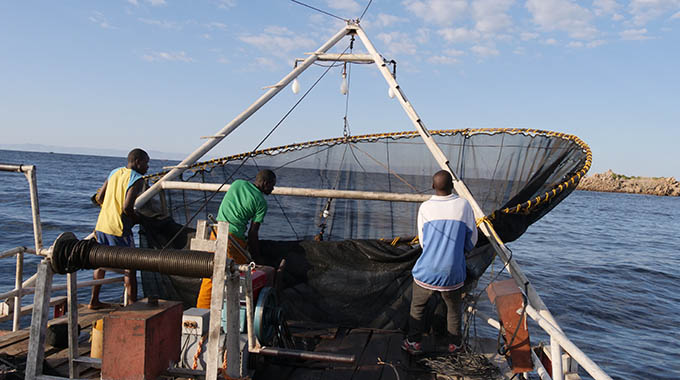
Walter Nyamukondiwa Kariba Bureau
COMPANIES and individual fishermen in Kariba who have been hit by falling catches, are seeking ways of helping restock the lake to reverse the decline, with poaching and overfishing by licensed rigs throughout the breeding season emerging as major concerns.
The initiative seeks to reorganise the industry to allow replenishment while sustainable exploitation of the resource continues.
It is hoped the initiative will feed into the Zambia-Zimbabwe Joint Fisheries Management Committee (JFMC), which has been mandated to manage fisheries and aquaculture in Lake Kariba and the Zambezi River. The JFMC held its first meeting in Kariba at the beginning of the year, to come up with recommendations on ways to manage commercial and artisanal fisheries and aquaculture on the lake.
Studies through a bio-economic modelling have shown that the kapenta fishing fleet has grown to triple the sustainable level of 500 which allows both Zambia and Zimbabwe to achieve optimum economic benefit. Fishing concerns said there was a lapse in regulation which allowed for more fishermen to start fishing, leading to the overexploitation that is now threatening the existence of the industry.
Some have proposed the shutdown of the lake during the rainy season to allow breeding, which would replenish the lake while regulation of the number of people with fishing permits is being done.
Fishermen contend that the number of people fishing on the Zimbabwean side was not known, which has led to overfishing. On its part, ZimParks has suspended the issuing of new permits while demanding that permit holders stick to their basins. There are five basins in Lake Kariba with some deemed to be more lucrative and economically viable than others.
Mrs Sithembiso Sibhula believes that the basins could be shut down during the period when catches are low.
“What we lack is proper statistics because catches by poachers (mapongorani or mabheura) are not accounted for. We had a lot of illegal fishing that took place and those catches were not accounted for,” she said.
Rotating the shutdown would ensure the market remained adequately supplied to fend off imports.
Zimbabwe has committed to harmonise its monthly lunar or full moon stoppage for kapenta fishing with Zambia from the current seven days to 10 days by 2021.
“What we lack is proper statistics because catches by poachers (mapongorani or mabheura) are not accounted for. We had a lot of illegal fishing that took place and those catches were not accounted for,” she said.
“My take is to bring sanity first by enforcing existing laws so that people submit information on their catches. What I know however, is that basins have peak and low periods for example Basin 5 peak is August to October while Basin 4 peaks during the cold season. We can stop during those low periods basin by basin.”
Rotating the shutdown would ensure that the market remains adequately supplied to fend off influx of fish from other countries.
Zimbabwe has committed to harmonise its monthly lunar or full moon stoppage for kapenta fishing with Zambia from the current seven days to 10 days by 2021.
